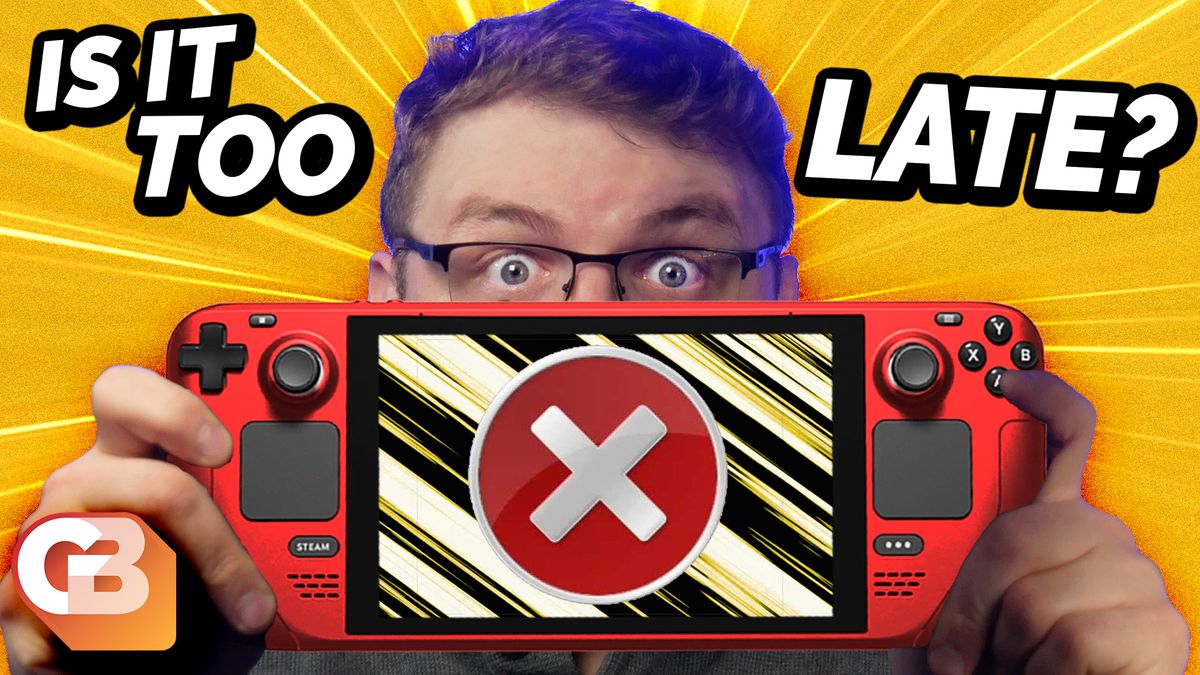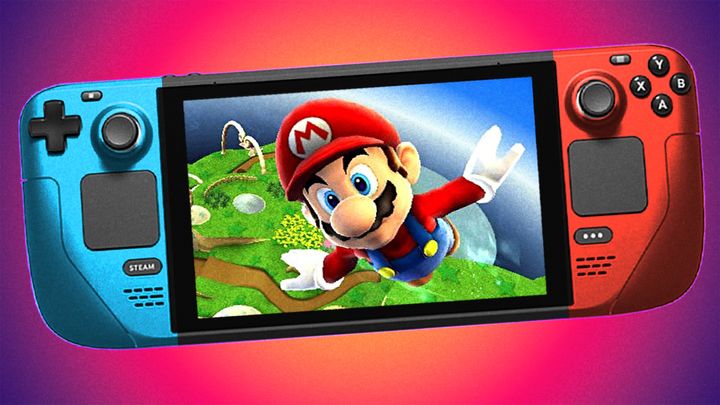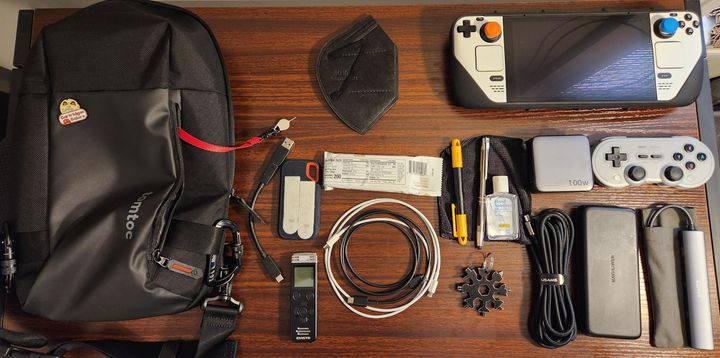Is it safe to buy a Steam Deck right now?
The Steam Deck is a heck of a device... but with challengers in the handheld PC space making their debut, will the Deck have real staying power? Is it wise to buy a Steam Deck now or should you buy a ROG Ally instead?

That’s a great question. Since I’m known for being a huge Steam Deck fan, you may be surprised to hear that I’m not going to categorically say “yes, buy a Steam Deck right now.” No, in fact, there are many factors that contribute to whatever answer you’re going to arrive at.
Because truthfully, this is an individual decision that comes down to your use-case. So I want to go over what I feel are the biggest factors to consider when deciding which handheld to buy.
Games: what do you want to play?
This comes down to taste and preferences. If you’re looking to play Destiny on your Steam Deck, well, Destiny’s developer Bungie has proven pretty hostile towards the Deck, so that may rule it out as your first choice.
And similarly, if you’re into many of the big multiplayer titles then they’re not super compatible with the Deck yet. And while there have been many major strides towards greater multiplayer compatibility on Deck, there are still a ton of popular online games that simply can’t be played on Steam Deck today. If those are the games you play most often, then your decision is being made for you.
But if you are a fan of indies or of AAA single player experiences then you’ll find yourself right at home on Deck.
Indie darlings like Vampire Survivors, Dead Cells, Stardew Valley, DREDGE, and Hades all consistently rank in the top 20 most played games on Deck each month. But it doesn’t stop there. So many other releases like Tunic, Stray, No Man’s Sky, and Valheim deliver robust experiences to the Steam Deck from indie developers.
And then there are major titles from PlayStation, Electronic Arts, Warner Bros Games, Capcom, and even Microsoft have either released with, or otherwise gained, Steam Deck support in the last year. Titles like Marvel’s Spider-Man, Dead Space, Hogwarts Legacy, and Resident Evil 4, have all seen official Steam Deck support at launch while titles like Halo Infinite and The Master Chief Collection have brought official support to the table after their initial release.
And let’s not forget that Gabe Newell has stated there are several games in the works at Valve. This is leaning into speculation, a bit. But that doesn’t change that there are some pretty heavy rumblings of an imminent new title from the Half-life and Portal developers. We’ve seen Valve register a trademark for “Neon Prime” using the exact same language that the trademark for “Half-life: Alyx” used. So perhaps we’ll see a new game from Valve sooner rather than later.
Now there is the caveat here that Steam Deck doesn’t have the same near-universal compatibility that Windows does. But expecting it to support every single game would be like expecting the Xbox to support every PC game just because Microsoft also makes Windows. The way I think of the Steam Deck is that it’s a separate platform from the PC. Steam Deck has all of the benefits of the PC but with a distinct library of games that happen to be a subset of your existing library.
However, if you’re a PC gamer, then you know there’s more than one way to get games. Not all of them are on Steam. And Valve facilitates a secure way to get other games onto your Steam Deck with the Discover store–a secure way to install other apps and services on your Deck.
Other platforms
Using the Discover store, you can download the Heroic Games Launcher. Heroic is a free and open source tool that gives you access to your existing Epic Games and GOG Library. And you can go even further with Lutris which handles not only your Epic and GOG titles, but also your Humble, Ubisoft, and Battle.net catalogs as well as others.
On Windows, each of these would have to be their own launcher, downloaded separately, updated independently, and each one consuming precious background resources. On a power-limited handheld, let’s just say that’s “less than desirable.” But on Steam Deck? All of that is abstracted away and all you’ve gotta worry about is having fun.
Emulation
There’s also emulation. While there are many great options no matter which direction you take, using ready-made solutions for Steam Deck simplifies the process of installation and setup.
RetroDECK provides the tried and true EmulationStation launcher as a fine choice for organizing and playing your retro collection. There’s also EmuDECK that uses the Steam Rom Manager to integrate your ROMs and ISOs right into your Steam library. While you can get both of these no matter what platform you choose, they are best experienced on their namesake: the Steam Deck.
The decades' old debate...
But that leads me to my next topic. Platform. What makes the Steam Deck special? Why would so many people choose the Linux-powered Steam Deck over any other handheld running Windows?
After all, most games are designed specifically for Windows, right? Surely that means Windows is the correct choice when it comes to PC gaming. That’s the obvious hypothesis behind the ROG Ally’s constant reiteration that their handheld is a Windows PC. Even going so far as to use the hashtag #PlayALLYourGames.
But not so fast. The Linux vs. Windows debate has been raging since the early 90’s. And there’s no right answer.
While Microsoft has exerted dominance over the general purpose operating system space for decades, the fact is, it’s a general purpose operating system. It’s designed to cast a wide net and accommodate an infinite variety of use-cases. It has to be broad, its APIs need to provide an environment that caters to the lowest common denominator. That means sacrifices need to be made somewhere; Windows has to ensure that word processors, multimedia applications, creative tools, web browsers, and games alike are able to run. But that necessarily means none of them can be shown any favoritism and few ever exploit the true power of the underlying hardware.
And look, Microsoft’s driver support has dramatically improved over the years. But that still doesn’t change the fact that applications are incapable of really leveraging the low-level hardware. It’s all necessarily abstracted away behind drivers and APIs like DirectX. Microsoft has the unenviable and seemingly impossible task of providing a target for hundreds of thousands of devices and chipsets and they all have to coexist in a stable and ever-changing ecosystem.
But this is fine. Truthfully, desktop Linux does all the above as well. But all of this is compounded by the proprietary nature of Windows. It’s wholly rigid in its application. Microsoft doesn’t provide a license for other vendors to distribute bespoke builds of their OS–at least not at a cost-effective, consumer-facing level.
Meanwhile, Linux gives hardware developers unparalleled control over every single aspect of the system. Its open source nature means that vendors can tailor a purpose-built version of the operating system to meet their specific needs; stripping out anything that compromises performance and delivering a near appliance-like system that is focused, performant, and crafted for specific hardware and a singular use-case.
When it comes to gaming, the latter is preferable. Games are highly demanding and need to be capable of taking priority over everything else like system tasks and background processes in order to get the most from the underlying hardware. Nowhere is the difference between general purpose versus application-specific operating systems illustrated more clearly than the contrast between Windows and Xbox.
Xbox’s operating system–while built atop the most basic components of Windows–strip out everything else. And, reportedly, apply heavy customization to the few Windows components that remain. Microsoft could have shipped Windows with every Xbox, but they knew that that decision would have left them at a serious disadvantage against PlayStation and Nintendo consoles. So they made the right choice and made a gaming-focused system.
So, too, Valve has constructed the Steam Deck as a single product, where the distinction between operating system and hardware is blurred. And while you can replace Steam Deck OS with Windows, you end up losing out on many of the defining features that make the Deck an appealing choice to begin with.
Software Updates
And that brings us to the next point… and I think this is one of the most important things when considering if it’s “too late” to buy a Steam Deck.
The Steam Deck ships with Steam Deck OS. There’s a synergy here between the hardware and software. As I said, the distinction between the two here is blurry. It’s kinda meaningless right now. Valve have yet to release SteamOS 3 as an installable operating system on other hardware. If you look closely at Valve’s messaging, Steam Deck doesn’t run SteamOS 3, it’s running Steam Deck OS. And that’s important. Because Steam Deck OS is built specifically for the custom AMD Aerith APU. If you try to run the Steam Deck OS recovery image on other hardware–even with an AMD APU–the changes are high you won’t be able to get it to even boot.
I keep saying this, and that’s because I think it’s crucial: it’s not really useful to talk about the Steam Deck and its operating system as separate things. They’re built for each other and they’re pretty much inseparable.
Going forward, the stewardship of the Steam Deck falls squarely on Valve. And they have an impressive track record of new stable software updates since before the official release of the device. The current cadence of stable updates has been more-or-less monthly, with almost daily beta channel updates adding features, fixes, and performance upgrades with each release.
It’s reasonable to assume that, even if the pace of beta development has slowed by the time we see a Steam Deck 2, we will still be seeing monthly stable updates that provide new features and performance improvements for the current-gen hardware.
Contrast this with any Windows handheld. Who is in charge of optimizing the Windows user experience for my 5 year old handheld? Well, nobody. The latest version of Windows generally runs pretty poorly on aging hardware. And while we might get driver updates from the third party vendor that supplied the off-the-shelf graphics chipset to the manufacturer for maybe six or seven years, the OEM provides a driver download page as a courtesy… really. It’s not like they’re obligated to do so. That’s really how it works in the Windows world.
As your hardware ages, you’re going to feel it. It’s almost this anthropomorphized feeling of your device progressively delivering worse performance until it’s practically unusable. And it’s so ubiquitous that you could be forgiven for thinking that that’s “the way it works.”
But it’s not. This is a product cycle that’s built on the idea of disposability, that leaves hardware vendors to only profit from the initial sale of the hardware.
As the Steam Deck ages, it’s only going to improve. And while practically tomorrow’s AAA titles may not be as performant as today’s games, developers could optimize their games for the Steam Deck for years to come.
Future Iterations
You may have noticed that I haven’t really talked about hardware specifications or anything like that. And that’s because, ultimately, I don’t think raw numbers are that important.
Sure, at 30 watts, the ROG Ally lays the smackdown on the Steam Deck in AAA games in terms of framerate. But at 10 watts? The reverse is true. At the end of the day, if you just want raw framerate with unlimited power consumption, your decision was made for you well before you clicked on this article.
But the fact is that at some point ASUS, AYANEO, or whoever needs to make money. And that necessarily means that the moment you get a Windows-based machine into your hands, it’s already obsolete. If it’s tomorrow or the next day they’re going to announce the newest version of the hardware and their marketing team will show the flashier specifications, the bigger numbers, the ambiguous and deceptive graphs, the charts with no labels for either axis… all in order to induce a fear of missing out so that you will buy the new device.
In contrast, while Valve has said that the Steam Deck is a “multi-generational device,” they’ve also committed to the Deck 2 being “years out.” So the Deck is more of a Nintendo Switch than a Samsung Galaxy S2-something ultra max with a nine month product cycle.
And if we extend that analogy a little further, Galaxy devices get three years of Android updates… and then it’s pretty much obsolete. Meanwhile new AAA games are being released for the Nintendo Switch because it’s a stable hardware target with a purpose-built OS that gives games access to the underlying hardware.
So if a developer choses, they could optimize their latest titles for the Steam Deck’s hardware for years to come. The operative phrase being “if a developer choses.”
See, the Steam Deck lives in this liminal space between a PC and a console. And we’ve seen so many unbelievably terrible ports of games for PC lately.
That’s because the PC is — let’s face it — annoying. From a developer’s perspective, you have to worry about complex hardware configurations, testing across team red, team green, and team blue and all the combinations that entails.
The nice thing about Deck is it offers a singular target that could easily become the lowest rung on the benchmark suite. If games for the next few years aim to have their minimum hardware spec be the Steam Deck? That could be earth shaking, even revolutionary, for PC gaming.
But this is all contingent on developers and publishers actually making that choice. Between the recent explosion in popularity of PC handhelds and the fact that the Steam Deck continues selling like hotcakes, well into the millions of units, I think the choice is clear for any dev that cares about decent PC ports.
And if developers decide to support the Steam Deck through its product lifecycle then, to me, the Deck is a no-brainer choice for anyone who doesn’t want to think about specs or benchmarks or any of the other annoying things that comes with traditional PC gaming.
Because IF devs support the Deck through its lifecycle, then none of that will really matter to people who just want to play games.
That’s not to say that if you’re a PC gamer who wants to tweak and prod and test and maximize your performance that the Steam Deck isn’t right for you. In fact, if you can surmount the necessary technical differences between Windows and Linux, then you’ll find you have more control and better options when it comes to tweaking and refining your experience.
But if you care most about having the latest and most powerful hardware, the Deck really isn’t targeting you.
So is it safe to buy a Steam Deck right now? If have time to waste fretting over thermal power limits and benchmarks and blah blah blah, the Deck isn’t for you. Otherwise, as long as the games you want to play are compatible—regardless of what kind of gamer you are—I’d say that it’s not too late to pick up a Steam Deck and enjoy yourself.
Now that I’ve shared my thoughts with you, I’d love to hear what you’ve got to say about this. Sound off in the comments below.




Comments ()